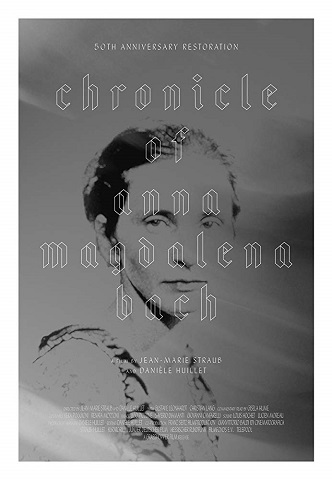
I’ve spent much of my adult life cultivating an interest in movies made before I was born and so I have a high tolerance, for someone my age, for the slower rhythms of past films. (I have watched so many old movies in part because i really want to know where things come from, but also because I like a lot of old movies.) And I like Bach’s music. And I think he is one of the most important people in the history of music. And I like watching musicians play music. And I like unconventional approaches to telling stories. But I must say I find this “biography” of Bach to be a very frustrating experience.
Have you ever been to a “period” concert, where the musicians play music of a given era with instruments manufactured in that era (or play with modern instruments made to those specifications) and who sometimes where period costumes?
I have, and it’s a different experience though I’m not sure how interesting or edifying it is. The “period instruments” movement seems to be mostly motivated by people who think that music can only be played one way, that is the way the composer “intended”. This bizarre idea presupposes that the intent of a dead person – usually someone who has been dead of centuries in the case of western “classical” music – can be understood by someone living in the present. Moreover, and more problematically, the “period instruments” people often then decide that different approaches to older music are less legitimate or even illegitimate.
If you can’t tell, I think this is insane. I think it’s insane because nobody can know another’s mind, even if that person is a composer who left notes on his scores and diaries explaining his intentions. But it’s more insane because music changes, develops and grows through each generation taking from the past and using it to create the future. To insist that Bach, or whomever, can only be played on 18th century instruments in 18th century buildings and by musicians wearing 18th century clothes is in effect to say that nobody currently living should use Bach’s music to create new music. I.e. that the musical past is off-limits for creative purposes and is only available as (sound) monuments or paintings or what have you.
This film strikes me as the “period instruments” approach to music put to film. Most of it is made up of performances of (snippets of) Bach’s music played by musicians in period costume performing on period instruments in the actual buildings in which Bach worked. The film is narrated by his wife who appears to be reading diary entries, which may or may not have been based upon Bach’s own. (I didn’t bother to look that up but there are shots of letters and such on screen.) That sounds impressive, and there’s something about the idea that impresses me even though I generally hate the whole “period instrument” thing, but it also begs the question “why?”
What is the point of film? That’s a stupid question but my answer is something along the lines of the same for any form of art: to transport the viewer (reader/what have you) outside of their own specific experience into the experience of others. This film tries to send you back to Bach’s time, to hear Bach’s music as it would have been played in the places it was played. But in doing so the filmmakers seem to have forgotten that people were involved in making this music, at least until about 40 minutes into the film.
40 minutes into the film dialogue between characters inexplicably appears and, about 15-20 minutes later, there is something which this film thinks passes for drama. (An argument! Sort of…)
I think the filmmakers had a choice here: they could have fully committed to their extreme idea of period performances in period costume in Bach’s places of employment. They could have made that movie and I wouldn’t have liked it but I would have respected the exercise a little bit more than what they chose to do instead, which is to arbitrarily insert dialogue into a film which was otherwise just narration and music. That feels, well, far more arbitrary than their initial conception of attempting to tell Bach’s life solely in snippets of musical composition and (mock?) journal entries. And the little bit of dialogue doesn’t add to the finished product, it just reinforces how little of it is in the film, and how little this film appears to care about character beyond the most surface level stuff. (I.e. Bach is an artist and he has integrity and his bosses are politicians or bureaucrats and don’t.)
There are many questions that could be explored here but one that interests me is: Bach was continually creatively or financially failed by his superiors but is now held to be perhaps the most important person in the history of western art music – why could they not see his genius? But this film is not trying to deal with that question or seemingly any other. It just wants to create this stuffy, staid world of Baroque music where everything is exactly how it would be in museum, i.e. without real human beings.
This is not a terrible film. For all the things I said about it, it is clearly made with a distinct artistic intent and it is (as far as I know) utterly unique in the history of film up until this point. But it is not a good way to tell the story of a person, especially a person as compelling as Bach. Instead, it’s basically a living Baroque painting with sound and, as such, I cannot say it is a good film.
6/10 because of its uniqueness